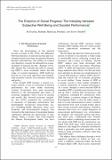The Empirics of Social Progress: The Interplay between Subjective Well-Being and Societal Performance
Author(s)
Fehder, Daniel Colin; Porter, Michael S.; Stern, Scott
Downloadpandp.20181036.pdf (521.1Kb)
PUBLISHER_POLICY
Publisher Policy
Article is made available in accordance with the publisher's policy and may be subject to US copyright law. Please refer to the publisher's site for terms of use.
Terms of use
Metadata
Show full item recordAbstract
Though economists have long recognized that GDP is not by itself a measure of societal well-being, most GDP alternatives incorporate direct measures of economic performance. We propose instead an independently constructed measure, a social progress index, focusing exclusively on noneconomic dimensions of societal performance, highlighting three core dimensions—basic human needs, foundations of well-being, and opportunity. GDP and social progress are correlated but distinct, the social progress dimension least related to GDP (opportunity) is strongly related to subjective well-being, and the relationship between social progress and well-being is greater for individuals at lower relative income and educational attainment.
Date issued
2018-05Department
Sloan School of ManagementJournal
AEA Papers and Proceedings
Publisher
American Economic Association
Citation
Fehder, Daniel, Michael Porter, and Scott Stern. “The Empirics of Social Progress: The Interplay Between Subjective Well-Being and Societal Performance.” AEA Papers and Proceedings 108 (2018): 477–82.
Version: Final published version
ISSN
2574-0768